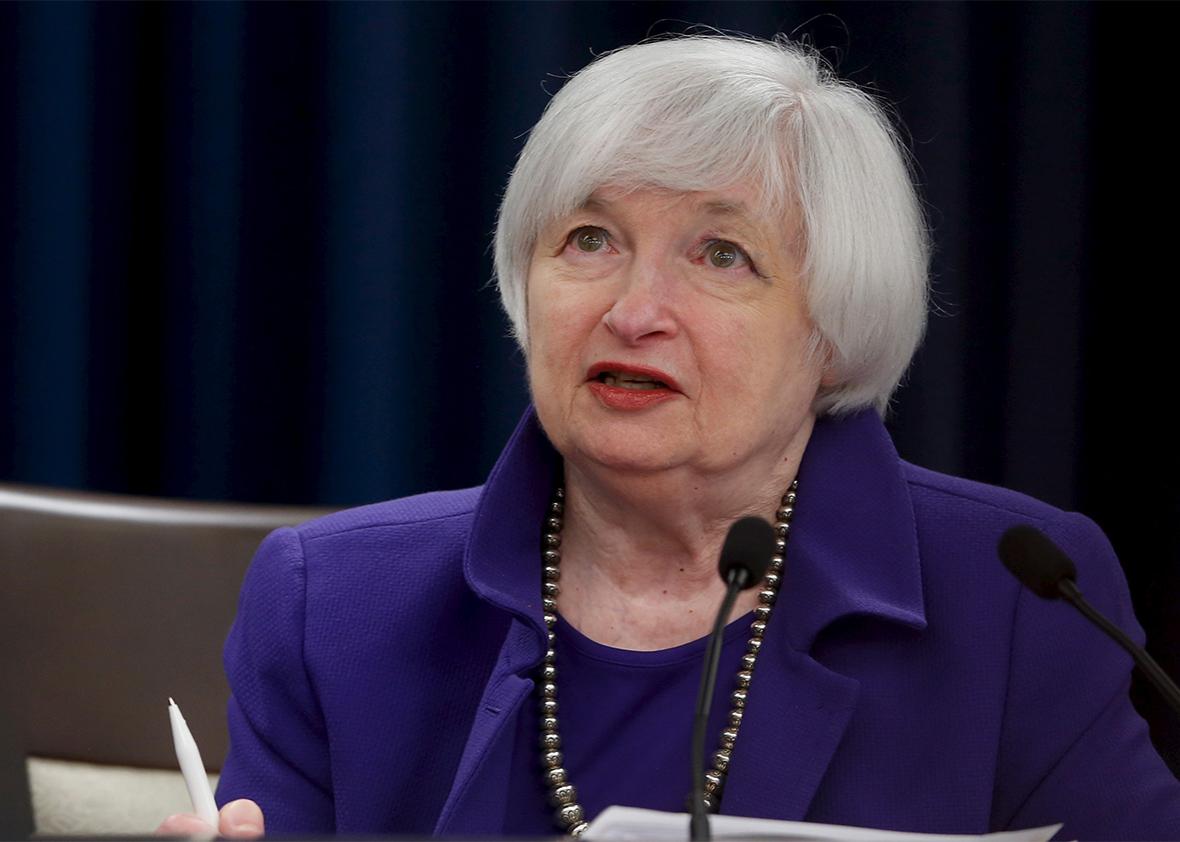On Wednesday, the Federal Reserve raised interest rates for the first time in almost a decade. The new rate is 0.25 percent, an increase from what was essentially zero.
The Fed’s reasoning was straightforward: If the economy grows too quickly, we could see the kinds of inflation and stock market bubbles that could endanger the entire economy. Raising rates, even by a touch, will slow growth and keep the economy from overheating over the medium-term. It’s also, in that regards, a sign of confidence: After a slow and painful recovery, the Fed believes the economy is now strong enough to justify higher interest rates.
Critics dispute this. “When the Fed sets out to slow inflation by raising interest rates, what it’s literally doing is squeezing the supply of credit to slow down job and wage growth,” explains Jeff Spross for the Week magazine. But, he notes, it’s not clear the economy is that strong. Yes, the joblessness rate is low, but wage growth is slow and progressively fewer people are participating in the workforce. It’s also true that inflation is low—perhaps too low, argue some economists.
We are still a far cry from the high labor participation rates of the late 1990s, or even those of the mid–2000s, before the recession hit. A slack labor market—especially in the absence of unions or other mediating institutions—means less leverage for higher pay and less job security, more so for low and mid-wage workers.
Which is all to say that the Fed’s hike could presage another year of steady growth, or a downturn as a still-fragile economy reacts to slightly tighter credit and slightly less liquidity. Or, put differently, the Fed’s rate increase may stand as the single most important event for the 2016 presidential election.
This gets to a broader observation about national politics. When we think about presidential elections—who wins, who loses—we tend to focus on individual performance. Barack Obama won re-election because he was talented, John Kerry lost his challenge because he wasn’t. But this is a mistake. Candidates matter in presidential primaries—where quality is the difference between a Jeb Bush and a Sen. Marco Rubio—but those elements are far less important at the level of a national general election.
With rare exceptions, both parties are so organized and their nominees so skilled that they neutralize each other; their respective strengthes and weaknesses just don’t matter. On the level of campaign and candidate, it takes an exceptionally good performance—or an unusually bad one—to move the needle.
What counts most are background conditions. Is the candidate an incumbent? What’s his approval rating? Is the economy growing? Are wages stagnant? Do ordinary people have work and opportunity? These are things we can quantify, and they matter more for election outcomes than any gaffe or sophisticated campaign metric. George H.W. Bush was massively popular in 1991, a year before his re-election fight, but lost because of a recession that hit in the run-up to voting. Likewise, Barack Obama could win re-election because the economy was growing through 2012, even as the objective numbers were poor. Things were getting better, and voters rewarded him.
Measured this way, 2016 begins as an even match. The economy is growing, but it isn’t on fire. President Obama isn’t popular, but he’s not unpopular either. Wages are growing, but not by much. And while the public is worried about terrorism, our foreign conflicts aren’t as large as they were under the previous administration. In this environment, Democrats could sell Americans on another four years, but Republicans could just as easily make a convincing case for change.
Put differently, the Fed’s rate increase is politically important because 2016 is essentially a coin toss. Even a modest economic effect, good or bad, could push the outcome in one way or another, as Americans decide that the economy has been good for them, or as they feel the pain from a recession.
Spectactors, and liberals in particular, should keep this in mind as they watch, observe, and gawk at the Republican presidential primary. Someone has to win, and all things being equal, that someone has an even shot at the White House. It is incredible—in almost every sense of the word—that figures like Sen. Ted Cruz and Donald Trump are serious candidates for the GOP nomination. And if that’s true, then—in the right and not impossible conditions—they could also be president.
